
ACS Physical Chemistry Au
Scope & Guideline
Advancing the frontiers of physical chemistry research.
Introduction
Aims and Scopes
- Physical Chemistry Fundamentals:
Research focusing on the core principles of physical chemistry, including thermodynamics, kinetics, and quantum mechanics. This area emphasizes theoretical analyses and experimental validations to deepen understanding of chemical processes. - Material Science and Nanotechnology:
Studies on the synthesis, characterization, and application of nanomaterials, particularly in energy storage, catalysis, and photonics. This scope is crucial for developing advanced materials with tailored properties. - Spectroscopy and Analytical Techniques:
Innovative applications of spectroscopic methods and other analytical techniques to probe molecular dynamics, structural properties, and interactions. This includes time-resolved techniques that provide insights into fast chemical processes. - Computational Chemistry and Modeling:
Use of theoretical and computational methods to understand chemical systems, predict behaviors, and design new materials. This includes molecular dynamics simulations, quantum mechanical calculations, and machine learning approaches. - Biophysical Chemistry:
Research that intersects biology and chemistry, focusing on the physicochemical principles underlying biological systems. This includes studies on protein dynamics, enzyme catalysis, and molecular recognition. - Environmental and Green Chemistry:
Exploration of sustainable practices in chemistry, including studies on pollutant degradation, sustainable materials, and energy-efficient processes. This area is increasingly relevant in addressing global environmental challenges.
Trending and Emerging
- Ultrafast Dynamics and Time-Resolved Studies:
There is a growing emphasis on ultrafast spectroscopy and time-resolved techniques to explore rapid chemical processes. This trend highlights the importance of understanding transient states in chemical reactions, particularly in materials science and biophysics. - Machine Learning and Data-Driven Approaches:
Recent publications have showcased the integration of machine learning techniques to analyze chemical data and predict properties. This emerging theme reflects a broader trend in the scientific community towards harnessing computational power for innovative solutions. - Nanostructured Materials and Interfaces:
Research focusing on the synthesis and application of nanostructured materials, particularly their interfaces, is increasingly prominent. This trend is essential for developing new technologies in catalysis, energy conversion, and sensing. - Biomolecular Interactions and Dynamics:
There is a rising trend in studying the dynamics of biomolecular interactions, particularly in the context of drug design and delivery. This reflects a growing recognition of the importance of physical chemistry in biological systems. - Sustainable Chemistry and Green Technologies:
An increasing number of studies are addressing environmental challenges through sustainable chemistry practices. This emerging scope is critical for developing eco-friendly materials and processes that align with global sustainability goals.
Declining or Waning
- Traditional Organic Chemistry:
Research focused on classical organic synthesis and mechanisms has seen a decline, possibly due to the increasing interdisciplinary nature of chemistry that emphasizes more integrated approaches involving materials science and computational methods. - Inorganic Chemistry Applications:
While still important, the specific applications of traditional inorganic chemistry, such as coordination chemistry without a clear connection to broader applications (like catalysis or materials), appear less frequently in recent issues. - Static Thermodynamic Studies:
The focus on static thermodynamic properties without consideration of dynamic processes has waned, as researchers increasingly recognize the importance of kinetics and dynamic behavior in chemical systems. - Basic Chemical Education:
Papers solely dedicated to fundamental chemical education methods, while still relevant, have become less frequent as the journal shifts towards more innovative and research-driven approaches that combine education with current research trends.
Similar Journals

Molbank is an open-access journal published by MDPI, dedicated to the fields of Biochemistry, Organic Chemistry, and Physical and Theoretical Chemistry. Established in 2002, this journal has served as a vital platform for the dissemination of research findings, where researchers and professionals share original articles focusing on molecular chemistry, synthesis, and related studies. With a commitment to open access, Molbank enables global access to scientific knowledge, fostering collaboration and innovation among scientists. While currently categorized in the fourth quartile for its field rankings, it provides a unique opportunity for emerging scholars to contribute to and engage with the scientific community. The journal is based in Switzerland, operating from its office at ST ALBAN-ANLAGE 66, CH-4052 BASEL, SWITZERLAND, and continues to attract submissions until 2024. Researchers, students, and professionals looking to expand their knowledge and participate in the dialogue of current molecular chemistry can benefit significantly from engaging with the content published in Molbank.
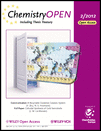
ChemistryOpen
Empowering Research Through TransparencyChemistryOpen is a leading open access journal published by WILEY-V C H VERLAG GMBH, dedicated to advancing the field of chemistry. With its ISSN 2191-1363, this journal has been a vital platform since its inception in 2012, promoting unrestricted access to innovative research findings and critical reviews in various chemistry domains. As a testament to its growing influence, ChemistryOpen has achieved a commendable Q2 quartile ranking in the 2023 Chemistry (miscellaneous) category, which highlights its quality and impact within the academic community. Researchers, professionals, and students benefit from the journal's commitment to making high-quality research accessible, facilitating knowledge transfer and collaborative insights among chemists worldwide. The journal's transparent open access model ensures that groundbreaking discoveries and methodologies are readily disseminated, fostering a culture of innovation and interdisciplinary dialogue in the ever-evolving landscape of chemistry.
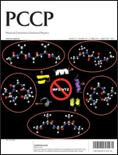
PHYSICAL CHEMISTRY CHEMICAL PHYSICS
Fostering Global Collaboration in Cutting-edge ResearchPhysical Chemistry Chemical Physics is a premier interdisciplinary journal published by the Royal Society of Chemistry, dedicated to advancing the fields of physical chemistry and chemical physics. With an impressive impact factor and categorized in the Q2 quartiles for both Physical and Theoretical Chemistry and Physics and Astronomy, this journal serves as a vital platform for the dissemination of high-quality research findings from 1999 through 2024. Based in the United Kingdom, the journal is committed to providing open access to its articles, enhancing the visibility and accessibility of research to a global audience. Researchers, professionals, and students alike are encouraged to contribute to this esteemed journal, ensuring impactful discussions and significant advancements in the understanding of chemical and physical phenomena. With strong Scopus rankings underscoring its relevance, Physical Chemistry Chemical Physics stands out as an essential resource for specialists striving to innovate and excel within these dynamic fields.
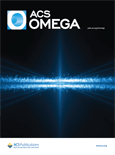
ACS Omega
Exploring Boundless Frontiers in Chemical Research.ACS Omega is a prominent open-access journal published by the American Chemical Society that has been serving the global research community since its inception in 2016. With ISSN 2470-1343, it focuses on a wide array of topics within the realm of Chemistry and Chemical Engineering, making it a crucial platform for researchers and practitioners aiming to disseminate significant findings across these disciplines. The journal maintains an impressive standing, ranking in the Q2 quartile for both Chemical Engineering and Chemistry categories, highlighting its impact and relevance in contemporary research. Additionally, with its Scopus ranks placing it within the top 24% and 27% of General Chemistry and General Chemical Engineering respectively, ACS Omega continues to foster innovation and facilitate collaboration among scientists. As an Open Access journal, it ensures that research outputs are freely available to all, enhancing the accessibility and visibility of contributors’ work, thus playing a critical role in advancing scientific knowledge globally from its headquarters in Washington, D.C.
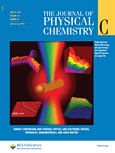
Journal of Physical Chemistry C
Illuminating the future of electronic and optical materials.The Journal of Physical Chemistry C, published by the American Chemical Society, stands as a pivotal resource in the realm of materials science and physical chemistry. With an impact factor reflecting its esteemed reputation, this journal showcases high-quality research spanning topics such as electronic, optical, and magnetic materials, as well as nanoscience and nanotechnology. Hailing from the United States, it operates without an open access model, yet its contributions are critical for advancing our understanding of surfaces, coatings, and films. Notably, the journal is classified in Quartile 1 (Q1) for several categories, underscoring its prominence in Physical and Theoretical Chemistry and related fields. Researchers, professionals, and students alike will find value in the comprehensive discussions and innovative research trends presented. The scholarly articles published from 2007 to 2024 not only drive forward scientific inquiry but also inform practical applications in various industries, making this journal an essential tool for anyone committed to excellence in the sciences.

JACS Au
Fostering collaboration through transformative scientific dialogue.JACS Au, published by the American Chemical Society, is a premier open access journal dedicated to advancing research in the rapidly evolving fields of analytical chemistry, organic chemistry, and theoretical chemistry. Since its inception in 2021, JACS Au has quickly established itself as a leading platform for high-quality research, reflected in its Q1 rankings across multiple categories for 2023, including Organic Chemistry and Analytical Chemistry. The journal focuses on innovative methodologies and applications that drive the discipline forward, making it an essential resource for researchers, professionals, and students alike. With an impressive Scopus ranking, consistently placing in the top tiers of its categories, and offering a broad range of access options for its readership, JACS Au aims to foster collaboration and disseminate transformative ideas that impact the global scientific community. Exploring diverse topics within chemistry, this journal provides a vital conduit for sharing groundbreaking research and enhancing scientific dialogue.
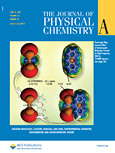
JOURNAL OF PHYSICAL CHEMISTRY A
Connecting researchers to the latest in physical chemistry.Journal of Physical Chemistry A, published by the American Chemical Society, serves as a leading platform for disseminating high-quality research in the fields of physical and theoretical chemistry. With an ISSN of 1089-5639 and E-ISSN of 1520-5215, this journal maintains a rigorous standard, demonstrated by its position in the Q2 category for both physical and theoretical chemistry as well as miscellaneous medicine within its 2023 category quartiles. As part of the greater ACS network, it operates with a solid Scopus rank of 76/189, placing it within the 60th percentile, emphasizing its credibility and impact in the chemistry community. The journal's objective is to enhance the understanding of molecular phenomena through innovative experimental and computational approaches, making it essential reading for researchers, professionals, and students seeking to advance their knowledge and contribute to scientific discussion. With additional open access options, the Journal of Physical Chemistry A continues to foster collaboration and the sharing of ideas in the vibrant scientific landscape of the United States and beyond.
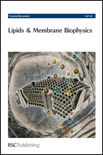
FARADAY DISCUSSIONS
Pioneering Research, Inspiring InnovationFARADAY DISCUSSIONS, published by the prestigious Royal Society of Chemistry, serves as a premier platform for scholarly discourse in the realms of both Physical and Theoretical Chemistry and Medicine. With its ISSN 1359-6640 and E-ISSN 1364-5498, this journal has a rich history dating back to 1947, evolving through significant periods of scientific advancement, with engaging discussions scheduled through to 2024. Recognized for its impact, FARADAY DISCUSSIONS ranks in the Q1 category for Physical and Theoretical Chemistry and Q2 for miscellaneous Medicine in 2023, affirming its role in pioneering research and innovative thought leadership. Researchers and professionals alike benefit from this journal’s commitment to open, critical dialogue on current trends and breakthroughs in chemistry, making it an essential resource for anyone looking to stay at the forefront of these dynamic fields.
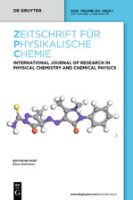
ZEITSCHRIFT FUR PHYSIKALISCHE CHEMIE-INTERNATIONAL JOURNAL OF RESEARCH IN PHYSICAL CHEMISTRY & CHEMICAL PHYSICS
Leading the Way in Chemical Research and DiscoveryZEITSCHRIFT FUR PHYSIKALISCHE CHEMIE-INTERNATIONAL JOURNAL OF RESEARCH IN PHYSICAL CHEMISTRY & CHEMICAL PHYSICS, published by WALTER DE GRUYTER GMBH, is a highly regarded platform for researchers in the field of physical chemistry and chemical physics. With an ISSN of 0942-9352 and an E-ISSN of 2196-7156, this journal serves as a vital resource for the dissemination of original research, critical reviews, and insightful discussions that span theoretical and experimental investigations. Recognized for its quality, it holds a Q2 classification within the 2023 quartiles of Physical and Theoretical Chemistry and ranks 72nd out of 189 in the Scopus database, placing it in the 62nd percentile. The journal’s extensive publication history, originating from 1943, showcases its long-standing commitment to advancing the understanding of complex chemical phenomena. Although it currently does not offer open-access options, it continues to attract contributions from leading experts worldwide, making it essential reading for professionals, researchers, and students dedicated to pushing the frontiers of chemical science. The journal is located in Berlin, Germany, at Genthiner Strasse 13, D-10785 Berlin, Germany.

Russian Journal of Physical Chemistry B
Illuminating the path of theoretical chemistry advancements.Russian Journal of Physical Chemistry B, published by MAIK NAUKA/INTERPERIODICA/SPRINGER, serves as a vital platform for the dissemination of novel research in the field of physical and theoretical chemistry. With an ISSN of 1990-7931 and an E-ISSN of 1990-7923, this journal has established itself in the academic landscape since its inception in 2008, continuing to publish groundbreaking studies that push the boundaries of chemical research through 2024. Ranked in the Q3 category in Physical and Theoretical Chemistry, it holds a Scopus Rank of 139/189, showcasing its significance despite a competitive field. The journal does not currently offer open access but remains dedicated to advancing knowledge and innovation within its niche, fostering collaboration among chemists, researchers, and educators. As a valuable resource for those seeking to stay abreast of the latest developments and theoretical advancements, the Russian Journal of Physical Chemistry B is an excellent choice for professionals and students alike.